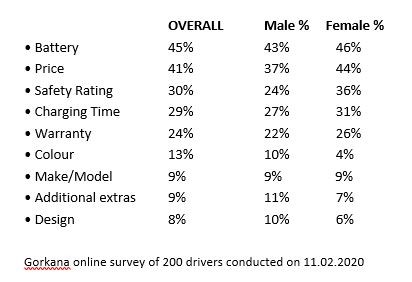Savvy electric car buyers seek reassurance over brand

Despite growing competition by manufacturers and retailers in promoting their electric vehicle offerings, a recent survey of 200 drivers by Venson Automotive Solutions confirms that the most important factors for people when considering an electric vehicle (EV) remain battery and price, closely followed by the vehicle’s safety rating. With EV sales predicted to rocket in the next couple of years, marketing brand lifestyle and experience may fall short when compared to pushing the practicalities of owning and driving an emissions free vehicle.
45 per cent of Venson’s survey respondents said the car’s battery was one of the factors that would influence them most when researching an EV. 41 per cent listed price, and 30 per cent placed high importance on the car’s safety rating. The results reveal a gap between the importance female motorists place on safety of the vehicles, compared to make. More than one in three women (36 per cent) consider the car’s safety rating to be a top influencer, compared with less than one in four men (24 per cent).
Alison Bell, marketing director at Venson Automotive Solutions comments: “Motorists often hold a strong allegiance to a particular manufacturer and model, even exterior trims and interior mod-cons. This is particularly true of user-chooser company car drivers who are typically given predefined fleet lists to select their next vehicle. But our survey suggests things are quite different when it comes to electric vehicles, with just 9 per cent of our respondents saying make and model of a car was one of the key factors to influence their ownership decision. In order of importance, brand falls below battery, price, safety, charging time, warranty and even colour.”
The Society of Motor Manufacturers and Traders (SMMT) reported that Battery Electric (BEV) and Plug-in Hybrid Electric (PHEV) models accounted for more than 10 per cent of all 2020 car sales in UK for the first time, and with standard hybrid models included the figure rises to an impressive 17.5 per cent of UK sales[i]. The SMMT also confirmed that most of these electric and hybrid registrations (68 per cent) were for company cars.
Alison Bell continued: “Private and company car driver interest in low and zero emissions vehicles is growing rapidly and this trend will gather even greater pace as charging networks grow, battery life improves still further and prices fall.
“To help company car drivers make the transition, fleet managers should consider providing information which gives practical ownership advice and details. These should include battery life, safety rating and charging time, to help employees weigh up the benefits of an electric or hybrid vehicle – over and above make, model and paint specification.”
To help fleet managers and company car drivers understand the costs and convenience of EVs and answer key questions that could be creating barriers to greater EV ownership Venson has produced a number of whitepapers, which can be downloaded here.






Comments